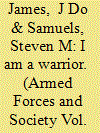| Srl | Item |
| 1 |
ID:
101327


|
|
|
|
|
| Publication |
2011.
|
| Summary/Abstract |
During World War II the Canadian Army was a small cadre force augmented by citizen volunteers. It was a colonial institution, dependent on the British Army for doctrine and staff training. After the war, the army became involved in a lengthy struggle to define its concept of professionalism. Modernizers aimed for a well-educated officer corps that was integrated with other elites and able to influence national security policy. Traditionalists wished to preserve regimental traditions and leadership based on social class. Contention between these factions resulted in stalemate, with modern management undercut by internal politics. The result was the failure of professional norms in the 1993 Somalia operation. Subsequent reforms have put a modern "constabulary-realist" model of professionalism in place.
|
|
|
|
|
|
|
|
|
|
|
|
|
|
|
|
| 2 |
ID:
177002


|
|
|
|
|
| Summary/Abstract |
This qualitative study examines how cadets at the U.S. Air Force Academy make sense of their experiences, form attitudes and beliefs, construct identities, and how a vocal minority of men create and perpetuate a biased gender norm. Despite an institutional intention of egalitarianism, cadets construct a highly masculinized culture. Focus group and interview analyses show how cadets perpetuate the military masculine-warrior narrative in sensemaking and the construction of gender differences. We argue that the narratives become an acceptable way to express gender biases, overriding the actual reason for the existence of fitness testing. We conclude by addressing the contradiction between policies promoting the inclusion of women in the military and the sexism described above. Acknowledging the lived experience of military personnel would allow for better perceptions of gender equality and suggests potential directions for policy, practice, and future research.
|
|
|
|
|
|
|
|
|
|
|
|
|
|
|
|
| 3 |
ID:
163573


|
|
|
|
|
| Summary/Abstract |
Organizational cynicism is a key factor in employee burnout, emotional exhaustion, and turnover and directly reduces organizational citizenship behavior, commitment, and effectiveness. Still, little empirical research examines antecedents of organizational cynicism. This study applies a dark side of leadership framework from an organizational and leadership perspective to examine the relationship between perceived toxic leadership and organizational cynicism in a military educational environment. Survey and interview data were used to assess the relationship between toxic leadership and organizational cynicism as reported by U.S. Air Force Academy cadets. Results demonstrate a positive relationship between toxic leadership and organizational cynicism, such that those who report having leaders with toxic characteristics are likely to have more negative attitudes toward their organization. Self-promotion emerged as the sole significant toxic leadership dimension predicting cynicism. Group differences in perceived toxic leadership are found for race but not for gender or amount of time within the organization.
|
|
|
|
|
|
|
|
|
|
|
|
|
|
|
|